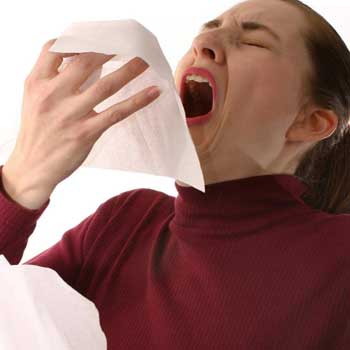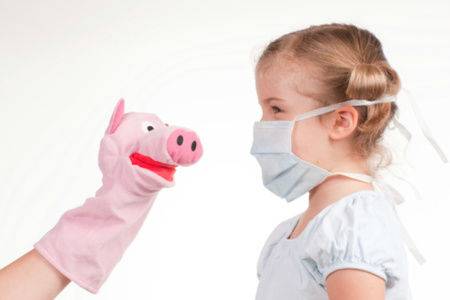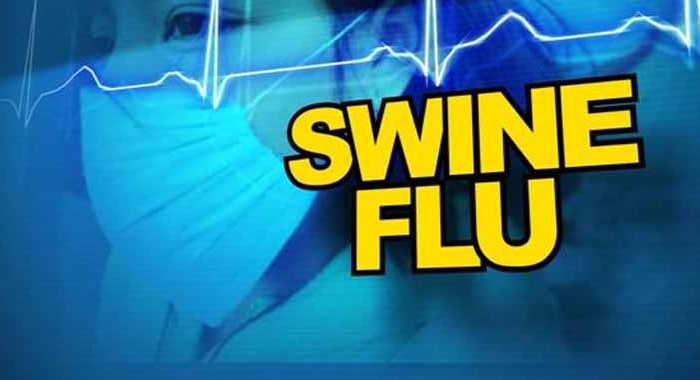 Swine influenza, or flu, is a contagious respiratory disease that affects pigs. When the flu spreads person-to-person, instead of from animals to humans, it can continue to mutate, making it harder to treat or fight, because people have no natural immunity.
Swine influenza, or flu, is a contagious respiratory disease that affects pigs. When the flu spreads person-to-person, instead of from animals to humans, it can continue to mutate, making it harder to treat or fight, because people have no natural immunity.
Symptoms include fever, runny nose, sore throat, nausea, vomiting and diarrhoea.
The number of people infected with swine flu is increasing in Egypt. There is no background immunity and is spreading from human to human.
At the time of writing this, Egypt’s health ministry has announced that 195 people are currently hospitalized with swine flu while 26 have died as a result of the virus.
Protecting yourself and others
Cover your mouth and nose when you sneeze or cough
The flu virus can travel through the air when a person coughs or sneezes. When you cough or sneeze you should:
- Turn away from other people
- Cover your mouth and nose with a tissue or your sleeve
- Use disposable tissues rather than a handkerchief (which could store the virus)
- Put used tissues into the nearest bin, rather than a pocket or handbag
- Wash your hands, or use an alcohol hand rub, as soon as possible afterwards.
Wash your hands
Washing your hands regularly with soap and water or using an alcohol-based product (gels, rinses, foams – available at supermarkets and pharmacies) that does not require water – even when they aren’t visibly dirty – is effective in killing the flu virus.
Always wash your hands:
- After you’ve been to the toilet
- After coughing, sneezing or blowing your nose
- After being in contact with someone who has a cold or flu
- Before touching your eyes, nose or mouth
- Before preparing food and eating.
Don’t share personal items
The flu virus can spread when someone touches an object with the virus on it and then touches their eyes, nose or mouth.
If a member of your household has the flu:
- Keep personal items, such as towels, bedding and toothbrushes separate
- Do not share eating and drinking utensils, food or drinks.
Clean surfaces
Flu viruses can live on surfaces for several hours. If a member of your household has the flu, you should regularly clean surfaces such as tables, benches, fridge doors and door knobs with soap and water or detergent.
Avoid close contact with others if you are unwell with flu
Keeping your distance from others by standing or sitting back (at least one metre apart, where possible) will help reduce the chances of spreading the flu virus between people.
While you are unwell you should remain at home and avoid going out in public. If you are unwell, you should not go to work or school or attend other public or crowded gatherings, and avoid taking public transport. If you need to use public transport, it is recommended that you wear a mask to contain the virus.
Do not visit people who have the flu unless it is absolutely necessary.
If a member of your household has the flu, he or she should be separated from other members of the family if possible, and be encouraged to wear a surgical mask. If you are caring for someone who has the flu, you too should wear a mask and gloves when in close contact to protect yourself from catching the flu.
Preparing your household
 There are several things you can do now that will help you be prepared, should an epedemic occur:
There are several things you can do now that will help you be prepared, should an epedemic occur:
Have plans in place for if you and your family have to stay at home for a week or so during a pandemic. Talk to your family and friends and co-workers about this
If you live alone; are a single parent of young children; or are the only person caring for a frail or disabled person, think of someone you could call upon for help if you become very ill with the flu. Discuss with the person what help you might need and how that could best be provided
Think of someone you could call on to care for your children if their school or day care centre were to close during an epidemic but you still had to go to work. Discuss this with them
Have a telephone network for you and the people who live close by. Keep extra top up credit for your mobile phone in your home if applicable.
Put the phone number of your family doctor in a prominent place
Stock your pantry to ensure your household has an adequate supply of food, water and essential items to cope with a prolonged emergency situation. For many – adding in some alcoholic beverages may make the time pass more quickly. If its Gin – don’t forget the tonic
Think of someone who could help you with food and other supplies if you and your family were sick and could not leave the house
Teach children about hand washing and cough etiquette
Think about any extra supplies you might need – these could include prescription medications and personal hygiene supplies.
At work
To contain the possibility of an outbreak among your employees
Wash Your Hands FREQUENTLY – particularly before, during and after food preparation and/or consumption. Also after shaking hands or sharing office equipment
Stay away from work if you are sick.
Note: Even during the most severe pandemics, most people completely recover. Recovered workers will have immunity to the illness and can safely return to work.
Clean and disinfect work surfaces and office hot spots during the workday.
Note: Office hot spots may include shared office equipment such as faxes and microwaves, light switches, pens, time clocks, etc
What is swine flu?
Pigs spread their own strains of influenza and every so often people catch one, usually after contact with the animals. This strain is a mix of pig viruses with some human and bird viruses.
Unlike more typical swine flu, it is spreading person-to-person. A 1976 outbreak of another unusual swine flu in New Jersey in the US – prompted a problematic mass vaccination campaign, but that time the flu fizzled out.
So is it safe to eat pork?
Yes. Swine influenza viruses don’t spread through food.
How do I protect myself and my family?
Take commonsense precautions. Cover your coughs and sneezes with a tissue that you throw away or by sneezing into your elbow rather than your hand. Wash hands frequently; if soap and water aren’t available, hand gels can substitute. Stay home if you’re sick and keep children home from school if they are.
How easy is it to catch this virus?
Scientists don’t yet know if it takes fairly close or prolonged contact with someone who’s sick, or if it’s more easily spread. But in general, flu viruses spread through uncovered coughs and sneezes or-and this is important-by touching your mouth or nose with unwashed hands.
Note: Flu viruses can live on surfaces for several hours, like on a doorknob just touched by someone who sneezed into his hand.
Do I need to wear a mask?
The CDC says there’s not good evidence that masks really help outside of health care settings. It’s safer just to avoid close contact with someone who’s sick and avoid crowded gatherings in places where swine flu is known to be spreading. But if you can’t do that, CDC guidelines say it’s OK to consider a mask-just don’t let it substitute for good precautions.
Is swine flu treatable?
Yes, with the flu drugs Tamiflu or Relenza, but not with two older flu medications.
Should I take Tamiflu as a precaution if I’m not sick yet?
No. Overusing antiviral drugs can help germs become resistant to them.
How big is my risk?
For most people, very low.
What are the symptoms?
They’re similar to regular human flu-a fever, cough, sore throat, body aches, headache, chills and fatigue. Some people also have diarrhea and vomiting.
How do I know if I should see a doctor? Maybe my symptoms are from something else-like pollen?
Experts say if you live in places where swine flu cases have been confirmed and you have flulike symptoms, ask your doctor if you need treatment or to be tested.
Allergies won’t cause a fever. And run-of-the-mill stomach bugs won’t be accompanied by respiratory symptoms.
Is there a vaccine to prevent this new infection?
No. And CDC’s initial testing suggests that last winter’s flu shot didn’t offer any cross-protection.

